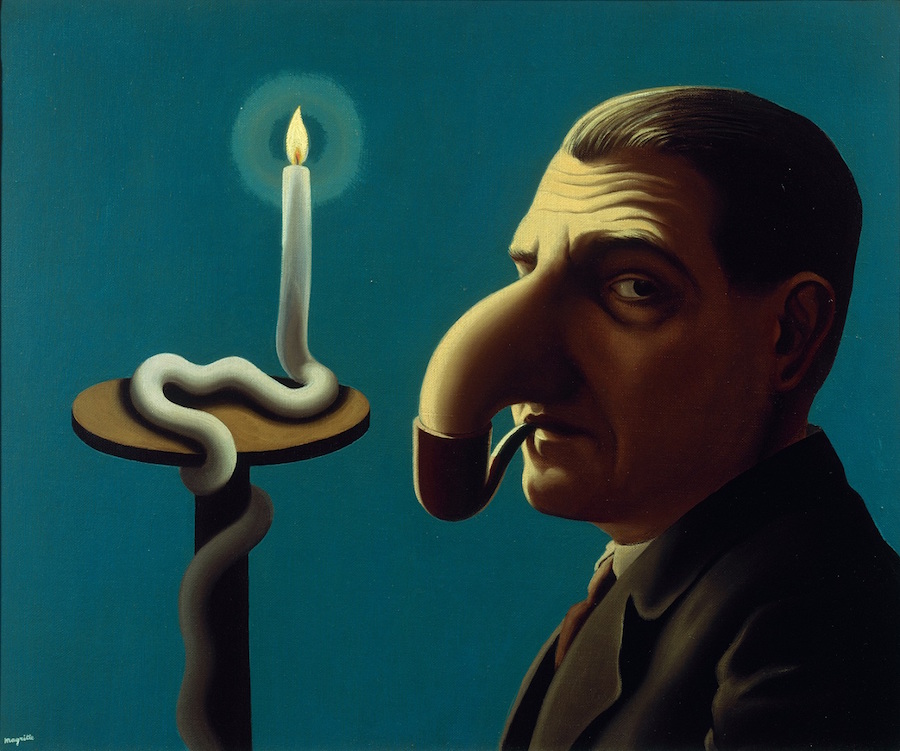
Rene Magritte La Lampe Philosophique (philosopher's Lamp), 1936 Scarf by Art Outlaws
René Magritte, La lecture défendue, 1936, oil on canvas. J. GELEYNS - RO SCAN/©2017 VG BILD-KUNST, BONN/ROYAL MUSEUMS OF FINE ARTS OF BELGIUM, BRUSSELS René Magritte, La Lampe philosophique.

LaLampephilosophiqueThePhilosopher’sLamp1936RenéMagritte Dasartes
Et un autre, "La lampe philosophique" (1936), où René Magritte (1898-1967) se représente en philosophe, montre son intérêt pour la philosophie.

René Magritte, la trahison des images Arts in the City
"The Philosopher's Lamp (La Lampe philosophique)" is one of the popular paintings by the surrealist Rene Magritte which is an ironic representation of the knowledge (the candle coil) and the philosophical thought focused on itself (a nose/head that smokes itself). Alan Hull's 1972 album Pipedream used "The Philosopher's Lamp" as the front cover.

René Magritte Evoking the mysterious — DOP Rene magritte, Magritte, Magritte paintings
Il n'hésite pas à se représenter en philosophe en 1936 avec " La lampe philosophique ". La lampe philosophique Un autoportrait où Magritte plonge son long nez dans une pipe, telle une trompe d'éléphant, c'est aussi une référence à Pinocchio, le plus grand menteur… Son regard narquois semble nous défier " Je ne suis pas dupe de vos mensonges ".

René Magritte revisité au Centre Pompidou
It began with an Irishman and a lost opportunity. In 1974, David Lampe, Buffalo State College professor emeritus of English, discovered that Irish poet John Montague was in town to teach a six-week summer session at the University at Buffalo (UB), but he wasn't scheduled to do a public reading. Lampe not only invited Montague to read from his works at Buffalo State, but he and his wife, Ruth.

The Vanderlust, Дали и Магритт в Брюсселе
L'élucidation d'une équation visuelle réconciliant, comme il l'écrit, « l'objet, la chose attachée à lui dans l'ombre de [la] conscience et la lumière où cette chose doit parvenir. » Il.

Magritte, la philosophie de l’invisible réalité Fragil Culture, société, initiatives citoyennes
René Magritte's 1947 painting Le Liberateur is a bold depiction of the subconscious mind. The subject of this painting (fig. 1) is a seated figure wearing a straw hat, a bright red shawl, a neatly-tailored pair of trousers, and a pair of black leather shoes. His head and torso have been replaced with a card or parchment with 4 silhouettes on.

La Lampe Philosophique (Modern Take) on Behance
"The Philosopher's lamp (La Lampe Philosophique)" is among famous paintings that made the surrealistic Rene Magritte a popular painter in the world. The picture ironically represents the philosophical thought and knowledge, about the candle oil, focused on itself as indicated by a long nose on the head that smokes itself.

Rene Magritte Philosopher's Lamp New HD print Etsy
La lampe philosophique en 1936, Les promenades d'Euclide en 1955 ou encore Les vacances de Hegel en 1958, autant de tableaux qui prouvent l'intérêt du peintre pour la philosophie. "René.

La Lampe Philosophique Upper Austrian Jazz Orchestra Amazon.de Musik
On le voit, dès l'entrée, avec la Lampe philosophique, un autoportrait de 1936. De profil, Magritte plonge son nez long et mou comme une trompe d'éléphant - on le sait, un éléphant, ça.

LaLampephilosophiqueThePhilosopher’sLamp1936RenéMagritte Dasartes
La Lampe philosophique (The Philosopher's Lamp), 1936 René Magritte Uploaded on Mar 2, 2016 by Suzan Hamer More artworks by René Magritte See all 187 psst Browse 187 artworks by René Magritte on Arthur.

La lampe philosophique (Rene Magritte) Ausstellung Schirn … Flickr
Original Title: La lampe philosophique Date: 1936; Brussels, Belgium Style: Surrealism Period: Brussels pre-war and war years Genre: symbolic painting Media: oil, canvas Location: Private Collection Dimensions: 50 x 60 cm Tags: philosophers Rene Magritte Famous works Attempting the Impossible • 1928 The false mirror • 1928

René Magritte La Lampe philosophique (1936) Artsy
The Schirn is presenting Magritte's masterpieces of enigmatic painting from the 1920s to the 1960s, among them his emblematic selfportrait entitled La Lampe philosophique (The Philosopher's Lamp) (1936), La Condition Humaine (The Human Condition) (1948), Les Mémoires d'un Saint (The Memoires of a Saint) (1960), Le Beau Monde (The Beautiful World.

Magritte, la philosophie de l’invisible réalité Fragil Culture, société, initiatives citoyennes
René Magritte and The Treachery of Images. "There is a desperation in all certainty," the artist William Kentridge once said, "political uncertainty, philosophical uncertainty, uncertainty of images is much closer to how the world really is.". René Magritte knew this better than anyone, his work posits its own truth, the unreliability.

Magritte The Treachery of Images Apollo Magazine
Spector, J. Magritte's La Lampe philosophique: A Study of Word and Image in Surrealism. Dada/Surrealism. 1977 1; 7(1) :121-129. Show: Harvard Citation Style | APA Citation Style

Foto René Magritte, La Lampe philosophique, 1936 Fotos Los 'problemas' filosóficos de René
Présenté en parallèle, l'autoportrait La Lampe philosophique, rappelle la fameuse pipe éclairée à la lueur d'une nouvelle lumière. Deux tableaux, deux ambiances, qui introduisent le cheminement de la scénographie de Didier Ottinger, commissaire de l'exposition, propice à une balade dans les recoins du cerveau de Magritte. Agrandir